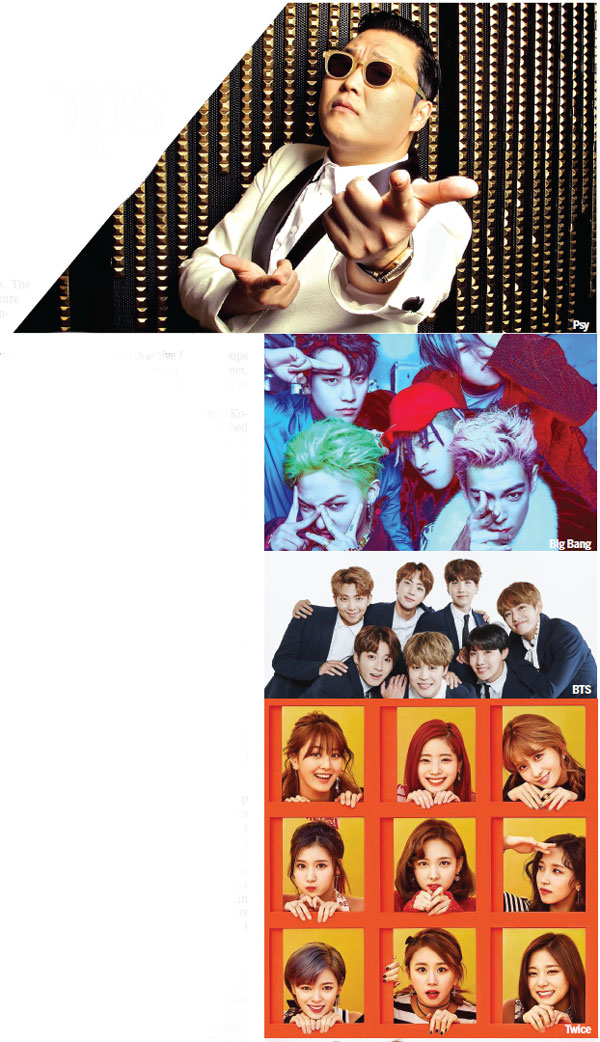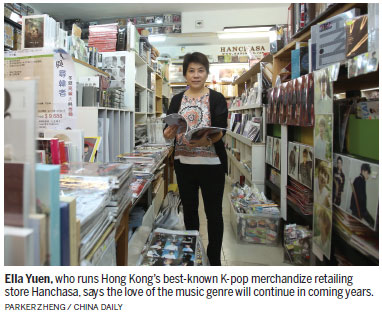Top of the K-pops
Updated: 2017-10-20 07:24
(HK Edition)
|
|||||||
Korean pop is alive and kicking in HK, finding newer fans, cutting across generations. Neil Li looks for reasons behind the genre's sustained popularity.
One doesn't need to be a K-pop fan to have heard of Big Bang, Super Junior, Psy or Girls' Generation. The four massively popular Korean pop (K-pop) acts have, between themselves, sold more than 238 million records worldwide. Korean music, drama, fashion and culture began to be noticed outside their home country in the late 90s. The first fans were from China and Japan. The rest of Asia caught on soon afterward. The trend, called hallyu, roughly translates as Korean wave. It held sway over the Asian markets and has now extended to other parts of the world, like the United States and Europe.
According to a report from the Korean Foundation, a non-profit, government-affiliated public diplomacy organization, there were over 35 million hallyu fans in 86 countries in 2015, a 67-percent increase from the 2014 figure of 21 million. Out of the 35 million fans, over 26 million live in Asia and Oceania, 7.6 million in the Americas and 1.6 million in Europe. A number of K-pop artists, such Big Bang's G-Dragon and 2NE1's CL, have found success working with Western musicians.
Capitalizing on their global reach, K-pop acts are increasingly holding concerts outside of South Korea. Recent concerts in Hong Kong like the "SMTown Special Stage" and G-Dragon's "2017 World Tour: Act III, MOTTE" in late August were quickly sold out and attended by hundreds of thousands of fans.
Catching the hallyu bug
Hong Kong's interest in K-pop began around the emergence of the handsome and energetic entertainer Rain and the period drama Jewel in the Palace (Dae Jang Geum) shown on television in 2003. The Korean specialty store Hanchasa, selling books, music and K-pop-related merchandize, was opened in Causeway Bay at the same time.
"The store opened at a time when hallyu was just beginning to get popular here. People would watch Korean dramas on discs and tapes," says Ella Yuen, the shop's marketing manager.
Twenty-year-old university student Joey Lo heard K-pop for the first time around 2007, just as Big Bang and Girls' Generation were emerging. "The idols were very good-looking, but I also really liked the rhythm of their music. It was so different from the Cantopop, love ballads," she explains. "K-pop has EDM (electronic dance music), funk and R&B (rhythm and blues) elements in them. Back then, there were a lot of slow songs in Cantopop. With its energy and explosiveness, K-pop left a good lasting impression and I just kept listening to it more and more."
Lo's favorite K-pop act is the nine-member boy group EXO who call their fans EXO-L. She belongs to a local group of EXO-Ls that regularly communicate and share any bit of news on their idols they can find and attend EXO concerts together. Lo estimates she has seen at least 30 concerts given by the five-year-old band across Asia. She once flew across three different countries in a week to catch their shows.
The presence of enthusiastic fans like Lo makes Yuen of Hanchasa confident of the sustainability of her enterprise. The love of Korean culture shows no sign of waning in Hong Kong, even 15 years after the store opened. "Customers today, especially the younger ones, are very willing to spend money on merchandize related to their favorite K-pop artists. They are interested in CDs, posters, photo books, magazines, etc," says Yuen.
Social media and the internet have made it much easier for people to discover and access K-pop, which helps the genre continue to drive interest and gain new followers. Carmen Lau, the store manager at Hanchasa, points out that sometimes it's their customers who update them on the emergence of yet another new K-pop music band.
"The younger fans nowadays are really enthusiastic and stay updated about the latest information on their favorites. I can't keep up with them. Besides, the ones they like now aren't always the stars from my generation. Each generation has its own idols and superstars," says Lau.
Indeed a decade ago, the big names in K-pop were Big Bang, Girls' Generation, TVXQ and Super Junior. While a section of the younger generation would still root for them, many have veered toward newer acts such as EXO, BTS, SHINee, Infinite and Apink.
Although each successive generation might be idolizing a different set of heroes, their shared love of K-pop often brings them to the same space. "We have parents bringing their children to the store. The parents find things that they are interested in, while the kids find their own things," Yuen says. "I have friends and customers who are in their late 30s and early 40s. Every time Big Bang comes to Hong Kong, they'll make sure to attend all the shows."
The more, the merrier
The one caveat in the K-pop machine is that as long as hallyu is in fashion more and more K-pop groups and musicians keep entering the market. There are at least over 115 active K-pop groups with a presence on the internet. Among these, 92 have debuted in 2010 or later.
"Nowadays, a lot of the older Korean entertainers have branched out and floated their own record labels to nurture the new generation of K-pop artists. The artists seem to be getting younger and younger," says Lau.
"I'm from an earlier generation and my fandom goes up to Big Bang and others in that mid-2000 period. I will occasionally listen to the newer K-pop music but I can't say that I like it as much." However, she notes that K-pop is actually improving, specifically in incorporating interesting storylines into their music videos, thus attracting a wider range of audiences.
Lo admits that it can be quite hard to distinguish between K-pop acts at times because of their similarities but she doesn't believe this has negatively affected the quality of the music. "You can say that the music hasn't changed much. The quality is still there but it can be repetitive," she says.
Lo continues to find the K-pop genre quite addictive and easy to enjoy, but then she also believes it will only be a matter of time before Hong Kong's interest in K-pop dies. If K-pop continues in its current path, she predicts that it would only be able to remain popular for another 10 to 15 years as eventually the audiences will move on to newer forms of music.
Yuen, however, is more optimistic. She cannot think of another music genre that might be able to replace the draw of K-pop. "Back in the 1970s, English music bands, like the Bee Gees and Beatles, were the craze in Hong Kong. Then it was Japanese music, which was very popular for about 10 years. It's been more than 15 years since K-pop first became popular so for those people who grew up listening to the genre, it's already a part of their identity."



(HK Edition 10/20/2017 page20)